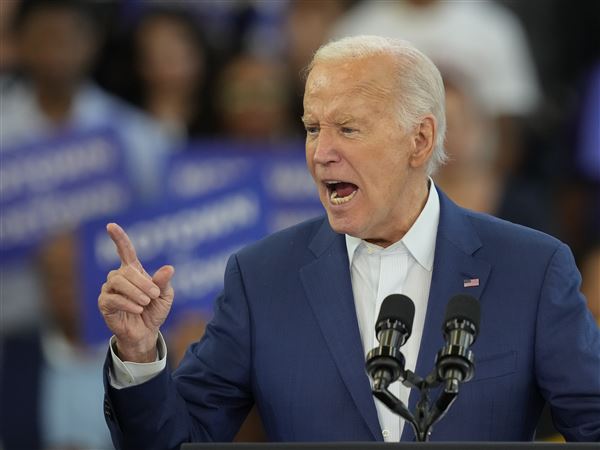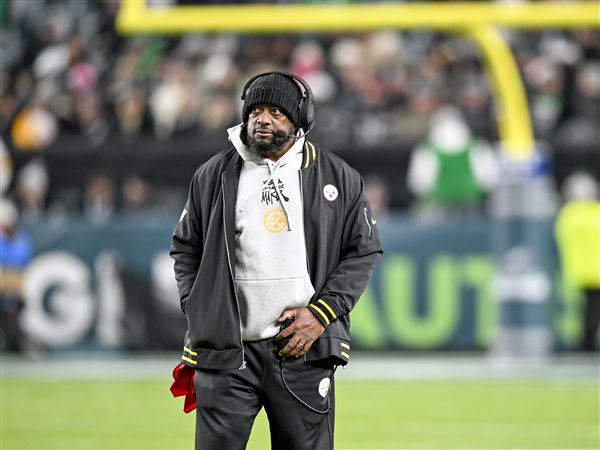OTTAWA -- Hockey players, hockey coaches and especially hockey analysts continent-wide have been falling all over each other this week explaining their own greater meaning of time and space -- how you've got to take it away from players such as Sidney Crosby and Evgeni Malkin and Alexander Ovechkin and anyone else who can reliably put a puck in a net. But what Ottawa gave the Penguins last night went beyond time, beyond space.
Ottawa gave them time, space, eternity, infinity, mayonnaise -- whatever they wanted.
For about six minutes, they even gave them a hockey game.
The second period at Scotiabank Place Tuesday night was believed to be the first time an NBA game ever broke out during the NHL playoffs, but the mere possibility of eight goals being scored in 15 of those 20 minutes actually became evident one period prior to the shootout.
With the Penguins' Mike Rupp and Ottawa's Erik Karlsson sent to adjacent penalty boxes for trying to wrinkle each other's sweaters, 107 seconds of four-on-four hockey ensued, during which the Penguins quite literally skated rings around the Senators.
I mean I was looking for a French judge, a Russian judge, a girl in the sequins overdosed on lipstick, or at least someone in a Snoopy costume because this kind of orchestration generally can't be accomplished in ice hockey.
But Jordan Staal, Brooks Orpik, Sidney Crosby and Sergei Gonchar unleashed the Ice Capades on two platoons of hapless Ottawans for just about the entire four on four, so who could have been surprised that the Penguins, already up, 1-0, halfway through the first period of Game 4, were ahead, 4-0, barely six minutes into the second?
Or that they were ahead, 6-3, after the wild second period?
"I think we did a great job in the neutral zone and that's really one of the best games we've played when it comes to that," said Gonchar, who assisted on three of his team's first four goals. "It was not only during the four on four, but I think our team played a high tempo in every situation, and that's certainly one of the strengths that we have.
"When you have players like Sidney Crosby and Evgeni Malkin, players like that are always going to be able to create space, and, when that happens, it's easy for the other players."
The Senators were playing double jeopardy for most of this episode, because they were not content to just clear the runways for the Penguins' forwards, their giveaways were devastating. Near his own bench in the neutral zone, Jason Spezza backhanded the puck toward the center of the pond but telegraphed it to Crosby so badly that Sid was going about 85 mph when he streaked the other way in front of Chris Kunitz.
Sid put that one behind Brian Elliott precisely 14 seconds before Matt Cooke put another one behind him, then Crosby dismissed the Senators goalie for the game with his second goal and fourth of the playoffs barely three minutes later. Elliott's replacement, Pascal Leclaire, got right into the rhythm, getting himself torched by Max Talbot and Chris Kunitz before the second period ended. Talbot's tip-in from Craig Adams on a two on one was the umpteenth example of the Penguins' superior speed in open ice and the shocking amount of it there was.
"I think the biggest thing was our puck management, and that might have been bigger than just our skating," said Orpik, who was a plus-2 on 26 shifts (only Kris Letang had more) and authored five more jarring hits. "In the neutral zone, if we keep the puck wide, try not to make so many plays in front of their D, turn the D around and get pucks behind them, that's really working for us. It's just a matter of being disciplined and not trying to be fancy with the puck."
The dejected Ontario audience spent a good deal of lung power berating the on-ice officials, but, when your best idea in the face of a skilled Penguins onslaught is trying to put too many men on the ice (twice, because it's that good an idea), there's little room for laying it off on the whistlers.
Many of those same time-and-space experts were pretty confident that, if the Senators lost last night, this Eastern Conference quarterfinal was effectively over. Had they lost, 1-0 or 2-1, you could say that was open to debate, but when you are giving people such as Malkin and Crosby and Staal a glacier of real estate and 42 shots, solutions are virtually nonexistent.
"Pretty much when you get to this point in a series, you've seen everything a team's going to do," Crosby said. "You continue to try and adjust, and teams might still try something different, but, by now, you get a pretty good feel as to what they want to do."
For now, it appears they want it to be over in five games.
First Published: April 21, 2010, 4:00 a.m.














